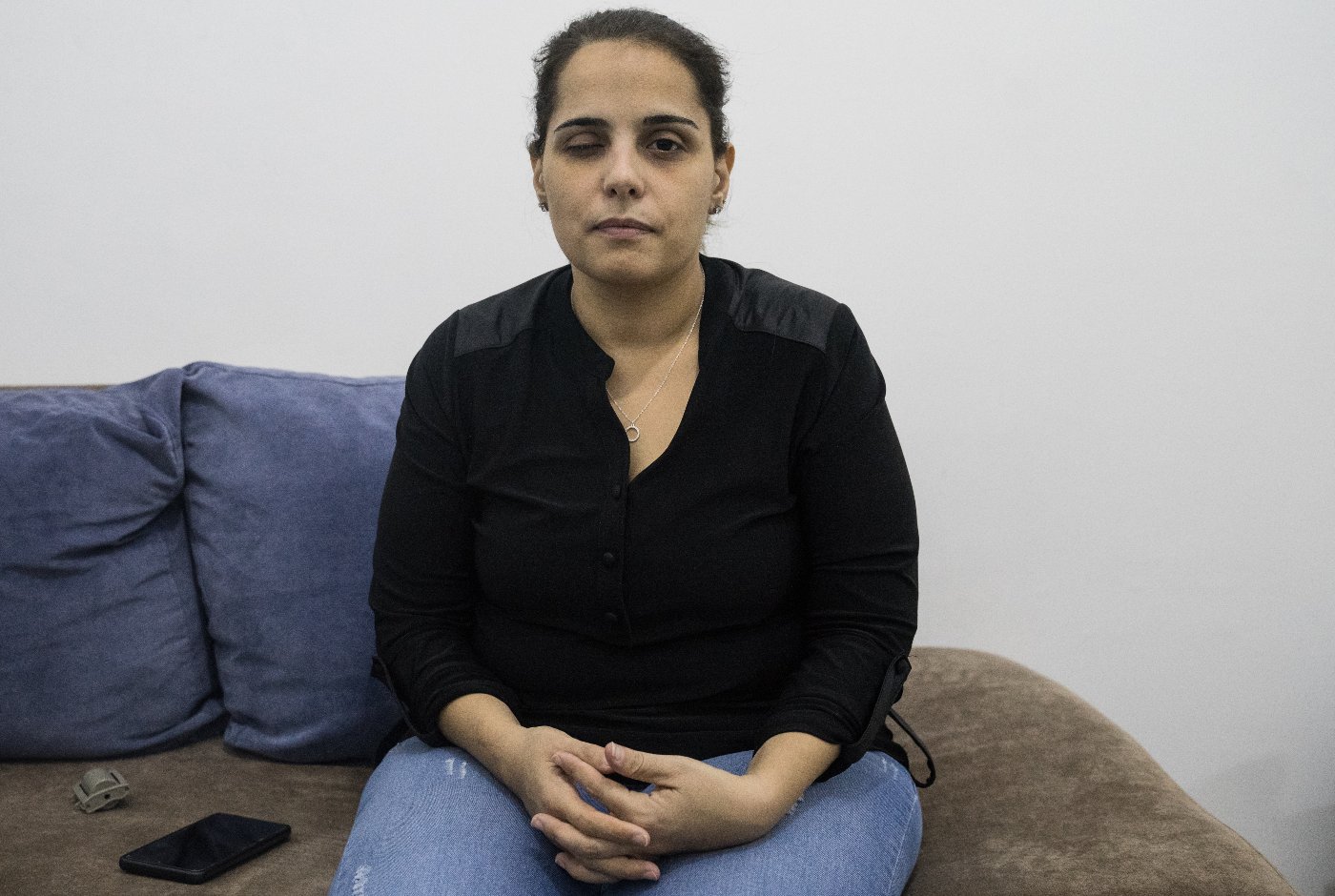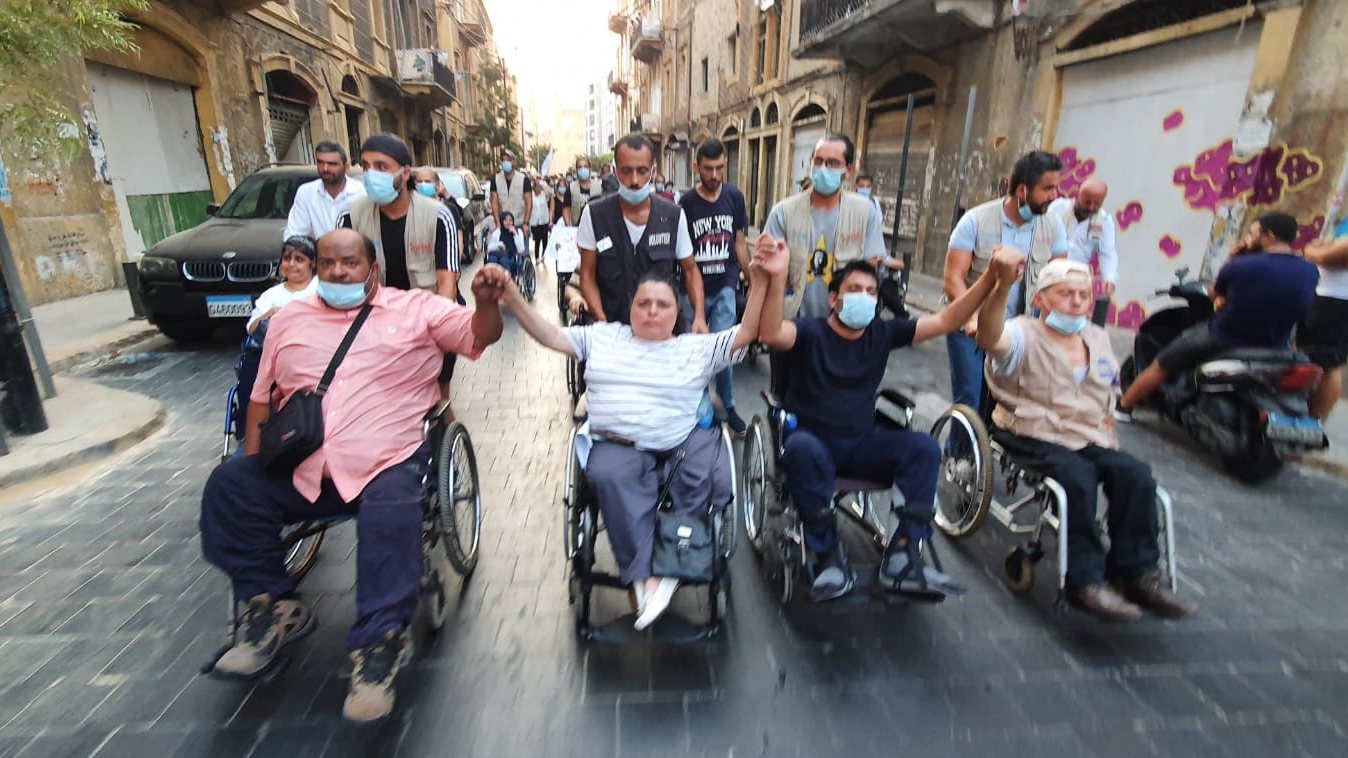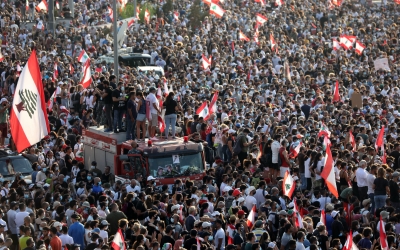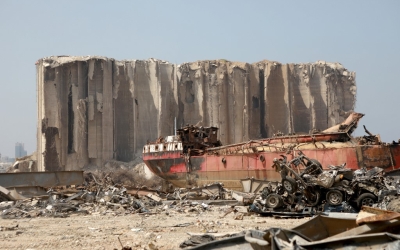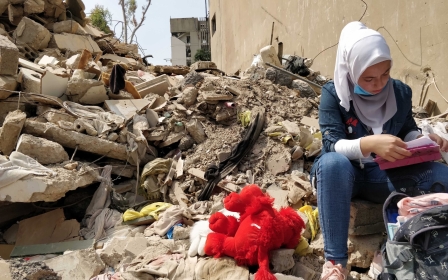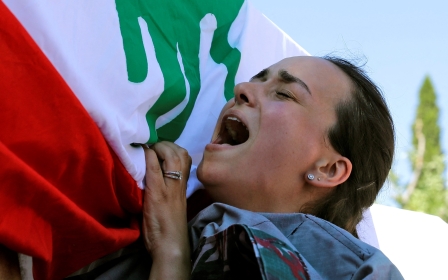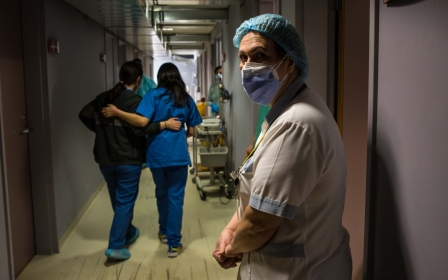Beirut port explosion: Disabled survivors fight for justice in face of government neglect
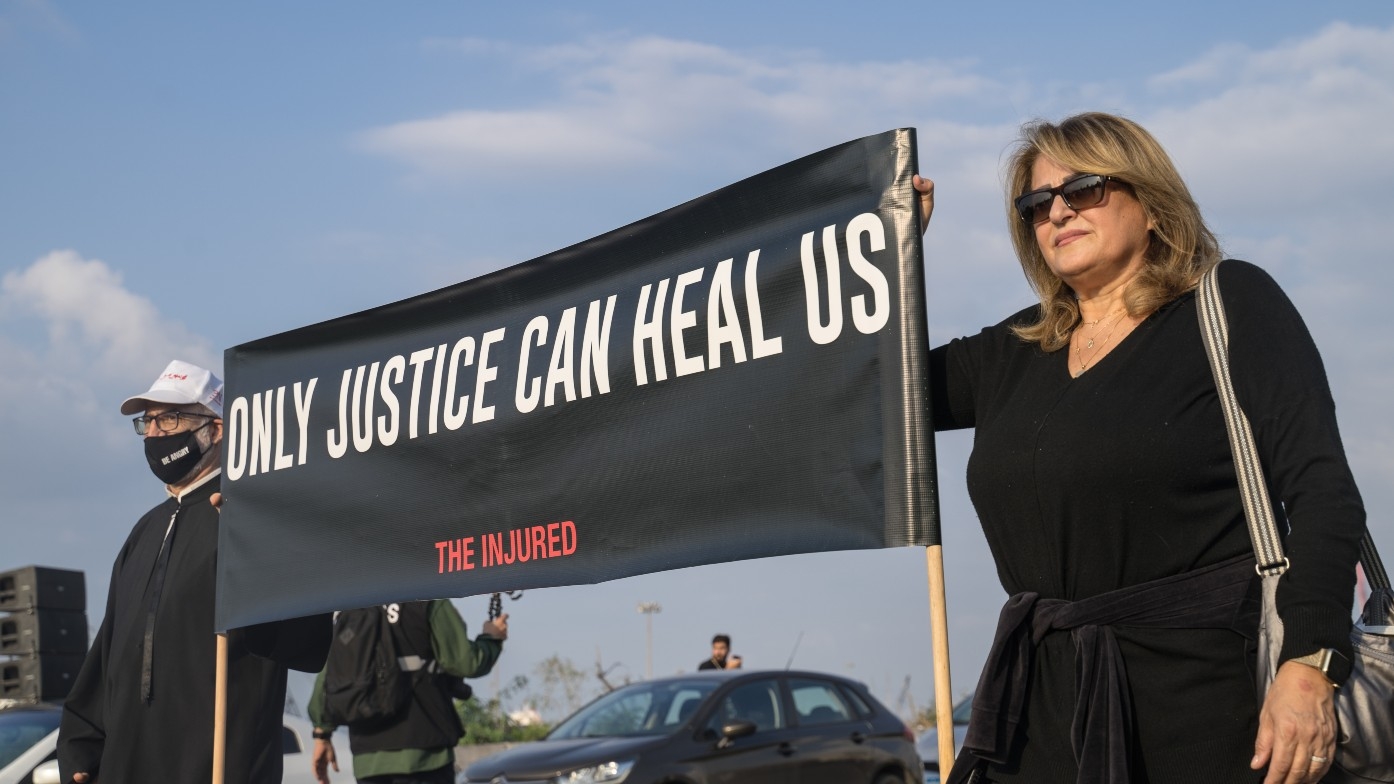
Abbas Mazloum used to work as a chef in a restaurant in Lebanon’s capital, less than two kilometres from Beirut port.
On 4 August 2020, when tonnes of improperly stored ammonium nitrate detonated in a port hangar in one of the biggest non-nuclear explosions in history, the shock wave threw the 45-year-old father of five against a wall, causing severe injuries to his spine, breaking four vertebrae and leaving him paralysed from the waist down.
After an initial operation the day after the explosion, Mazloum needed further treatment. But, due to the high cost of emergency care amid the country’s crippling economic crisis, he was not able to receive proper surgery until over a year after the blast, Sylvana Lakkis, president of the Lebanese Union for People with Physical Disabilities (LUPD), told Middle East Eye.
Mazloum's cousin, Noura, told the AP news agency that shortly after his most recent back operation, Mazloum became ill, developed a high fever, and died in October.
Friday marks International Day of People with Disabilities. But more than a year after the explosion - which killed as many as 251 people, by some counts, injured at least 6,500 and caused widespread damage in Beirut neighbourhoods - several hundred people who were left disabled by the blast continue to be neglected by the Lebanese government.
“He [Mazloum] could have been alive if the government had helped him,” Lakkis told MEE.
For her, the Lebanese state has failed the victims.
“There are still many people who have broken glass in their bodies, others who need life-saving operations but are still struggling to raise the money to afford them,” she said. “The government does not give people basic rights, and ignores them. People are not even recognised as victims, and die again and again.”
‘I thought I was dead’
Mirna Habboush is one of at least 800 people identified by the LUPD as having been permanently or temporarily disabled as a result of the explosion.
On that fateful day, the 36-year-old mother was driving on the highway running parallel to the port with her one-year-old son, to buy milk, when the blast occurred.
“The car was badly destroyed, everything inside was burning, and glass was all over my body,” she told MEE. “I could hear people shouting, asking for help. There were bodies all around me. From that moment on, I thought I was dead. I didn't believe that my little boy was alive, either.”
After managing to extricate herself from the burning metal frame, Habboush came across an army officer, who took her son to hospital on his scooter. Later, she managed to reach the hospital, despite several people refusing to drive her there.
“No one wanted to take me in their car because they were afraid of me. It was only later that I discovered that my right eye was cut into two and that bones were sticking out of my arm,” she recalled. “When I arrived at the hospital, it took me about 25 minutes to find my boy. I didn't want anyone to touch me until I found my boy.”
That night, doctors removed several pieces of glass from Habboush's right eye. Although they managed to save the shape of the eye, they were unable to restore its sight.
Like many others wounded in the explosion, Habboush has had to spend millions of Lebanese pounds on her operations and medical treatment. Since the port explosion, she has undergone five operations. Although the first was covered by her personal insurance and the second was funded by government aid, Habboush was denied reimbursement for the other three.
“When I asked the government to reimburse me, they told me that I am already covered by the National Social Security Fund [NSSF]. When I went to the NSSF, they told me that they would only cover 80 percent of the medical treatment. I went back to the Ministry of Health twice to ask them for the remaining 20 percent, and they kicked me out,” she said.
“There is no empathy from the government.”
The need for reform
The difficulties faced by Mazloum and Habboush are far from exceptional.
Ghida Frangieh, a lawyer and former chair of the board of local watchdog Legal Agenda, told MEE how the passage of Law 196 in December 2020, which is meant to ensure compensation and health benefits for victims of the blast, has created legal confusion that has allowed the government to absolve itself of responsibility for supporting the victims.
One of the things that Law 196 did was to register people with the NSSF who became totally or partially disabled as a result of the explosion.
“While the law was supposed to provide health coverage for victims with disabilities, it created a confusion as to what body was in charge of this coverage between the NSSF and Ministry of Health,” Frangieh said.
In short, various government institutions are passing the buck to one another and the victims are not being taken care of, she added.
Further adding to the confusion, Law 196 refers to some of the passages of Law 220, which governs the rights of people with disabilities. Although it was enacted in 2000, a lack of resources and improper implementation mean that Law 220 has never fully taken effect on the ground in the two decades since.
“Law 220 faces many obstacles related to the culture of discrimination against people with disabilities in Lebanon,” Frangieh said. “Like many laws in Lebanon, it was not implemented and was violated many times.
“In the same way that the government neglected people with disabilities from the war, it is now neglecting people who became disabled as a result of the explosion.”
Another problem concerning the rights of people with disabilities is linked to the very restrictive legal definition of disability in the country, which is depriving many people of access to life-changing support in health, education, employment, housing and social services. For Lakkis, Law 220 is "outdated, and not in line with international standards".
The fact that the government in power has not even attempted to make an official census of the number of people who have become disabled as a result of the explosion speaks volumes about their lack of concern for the many victims, Frangieh said.
“When we asked the Minister of Social Affairs, which issues cards for the people with disabilities, the number of people registered was extremely low and does not reflect the reality on the ground,” she said. “People who became disabled as a result of the explosion are among the most neglected groups of victims by the state.”
The many challenges ahead
In addition to the lack of compensation for the costs of medical operations, disabled people are also the first to be affected by Lebanon’s multifaceted economic and political crisis.
Lakkis expressed her concern that many companies affected by the severe financial downturn may dismiss people with disabilities before other employees, even as the country already falls short of disability employment quotas and accessible infrastructure.
With the reconstruction of Beirut still going on, there are few hopes that rebuilding efforts will keep disability access in mind in a city already difficult to navigate.
“The culture of corruption is very strong in Lebanon. We need to make sure at the operational level that all the policies are going to be inclusive, and that the reconstructed buildings are accessible for everyone,” Lakkis said. “We do not need slogans and speeches any more, we need action.”
For her part, Habboush no longer expects anything from the Lebanese authorities.
“They treated me like nothing and never wanted to help us, or tell us the truth about what happened on 4 August. For me, the government is practically non-existent,” she said.
Despite the hardships, she tries to look forward.
“What else can I say? Every day is a new challenge for me. I might have lost sight in one of my eyes, but some people lost their loved ones. I am just lucky to have survived that day.”
Middle East Eye propose une couverture et une analyse indépendantes et incomparables du Moyen-Orient, de l’Afrique du Nord et d’autres régions du monde. Pour en savoir plus sur la reprise de ce contenu et les frais qui s’appliquent, veuillez remplir ce formulaire [en anglais]. Pour en savoir plus sur MEE, cliquez ici [en anglais].


